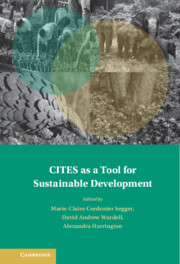Book contents
- CITES as a Tool for Sustainable Development
- Treaty Implementation for Sustainable Development
- CITES as a Tool for Sustainable Development
- Copyright page
- Contents
- Figures
- Tables
- Boxes
- Notes on Contributors
- Preface by CITES Secretary-General, Ivonne Higuero
- Foreword by Honorable Judge Antonio H. Benjamin
- Acknowledgments
- Abbreviations
- Part I Endangered Species, Sustainable Development and the Law
- Part II Sustainable Development in Law and Policy on Endangered Species
- Part III Global Implementation of CITES by Key Species/Commodity
- Part IV National Implementation of CITES
- 11 Sustainable Enterprise Development: Protection of Endangered Species in Omo and Other Potential Biosphere Reserves
- 12 The Biodiversity Multilateral Environmental Agreements Matrix in India: Synergies, Implementation Status and Future Challenges
- 13 Tanzania’s Fight Against Illegal Ivory Trade: Law-Enforcement Failures and Noncompliance with International Environmental Laws
- 14 The Impact of the CITES COP 12 2002 Decision on Mahogany on Peru’s Timber Trade
- 15 Strengthening CITES Compliance: Improving the Management of Resources Preservation and Cross-Border Wildlife Trade in China
- 16 How to Reverse the Fallacy of Command-and-Control in Combating Illegal Trade of Exotic Pets in Brazil
- 17 Lessons on Sustainable Development and Challenges to Illegal Trade: The Case of the Chilean Larch
- 18 The Return of the Markhor: Why CITES Matters
- 19 New Technologies for Effective Biodiversity Governance: Lessons from Orangutans in Indonesia
- 20 Regulation of Import of Hunting Trophies of Exotic Species into India by Framing a Look-Alike Policy to Conserve Indigenous Wild Fauna
- 21 Legislation for the Control of the Timber Trade in the Democratic Republic of Congo and the Congo Basin
- 22 To List or Not to List: Governance Challenges and Complexities in Global Frankincense Supply Chains
- Part V Emerging Issues and Synergies for CITES in the Context of Sustainable Development
- Part VI Conclusions
- Cases and Court Decisions
- CITES Resolutions and Documents
- Domestic Acts and Regulations
- Multilateral Treaties and Declarations
- Recommended Resources
20 - Regulation of Import of Hunting Trophies of Exotic Species into India by Framing a Look-Alike Policy to Conserve Indigenous Wild Fauna
from Part IV - National Implementation of CITES
Published online by Cambridge University Press: 27 July 2023
- CITES as a Tool for Sustainable Development
- Treaty Implementation for Sustainable Development
- CITES as a Tool for Sustainable Development
- Copyright page
- Contents
- Figures
- Tables
- Boxes
- Notes on Contributors
- Preface by CITES Secretary-General, Ivonne Higuero
- Foreword by Honorable Judge Antonio H. Benjamin
- Acknowledgments
- Abbreviations
- Part I Endangered Species, Sustainable Development and the Law
- Part II Sustainable Development in Law and Policy on Endangered Species
- Part III Global Implementation of CITES by Key Species/Commodity
- Part IV National Implementation of CITES
- 11 Sustainable Enterprise Development: Protection of Endangered Species in Omo and Other Potential Biosphere Reserves
- 12 The Biodiversity Multilateral Environmental Agreements Matrix in India: Synergies, Implementation Status and Future Challenges
- 13 Tanzania’s Fight Against Illegal Ivory Trade: Law-Enforcement Failures and Noncompliance with International Environmental Laws
- 14 The Impact of the CITES COP 12 2002 Decision on Mahogany on Peru’s Timber Trade
- 15 Strengthening CITES Compliance: Improving the Management of Resources Preservation and Cross-Border Wildlife Trade in China
- 16 How to Reverse the Fallacy of Command-and-Control in Combating Illegal Trade of Exotic Pets in Brazil
- 17 Lessons on Sustainable Development and Challenges to Illegal Trade: The Case of the Chilean Larch
- 18 The Return of the Markhor: Why CITES Matters
- 19 New Technologies for Effective Biodiversity Governance: Lessons from Orangutans in Indonesia
- 20 Regulation of Import of Hunting Trophies of Exotic Species into India by Framing a Look-Alike Policy to Conserve Indigenous Wild Fauna
- 21 Legislation for the Control of the Timber Trade in the Democratic Republic of Congo and the Congo Basin
- 22 To List or Not to List: Governance Challenges and Complexities in Global Frankincense Supply Chains
- Part V Emerging Issues and Synergies for CITES in the Context of Sustainable Development
- Part VI Conclusions
- Cases and Court Decisions
- CITES Resolutions and Documents
- Domestic Acts and Regulations
- Multilateral Treaties and Declarations
- Recommended Resources
Summary
The author notes that many countries, including India, have witnessed the importation of hunting trophies of exotic species in large numbers, most of which are hunted and taxidermed from African countries. These imports, he explains, are regulated under the provisions of CITES. As a forerunner of conservation of wildlife, India has long banned the hunting of wild animals and has taken a holistic approach towards the conservation of wildlife in India. With the exception of use in educational and research institutes, the uninterrupted importation of hunting trophies of exotic wild animals for display in private or public places serves no public interest and may even increase the tendency of locals acquiring Indian wildlife, thereby indirectly encouraging the illegal activity of hunting and trade of wildlife within India. Additionally, the author underlines the difficulties of distinguishing imported hunting trophies of exotic species from the species that are look-alike with Indian wild fauna, which are accorded highest degree of protection under the domestic legislation, namely, the Indian Wildlife (Protection) Act, 1972
- Type
- Chapter
- Information
- CITES as a Tool for Sustainable Development , pp. 334 - 343Publisher: Cambridge University PressPrint publication year: 2023



